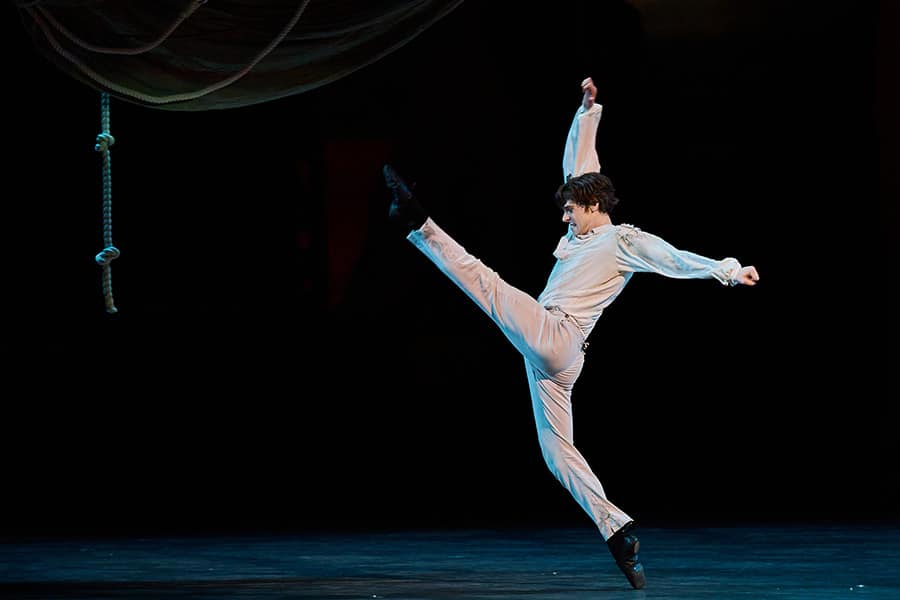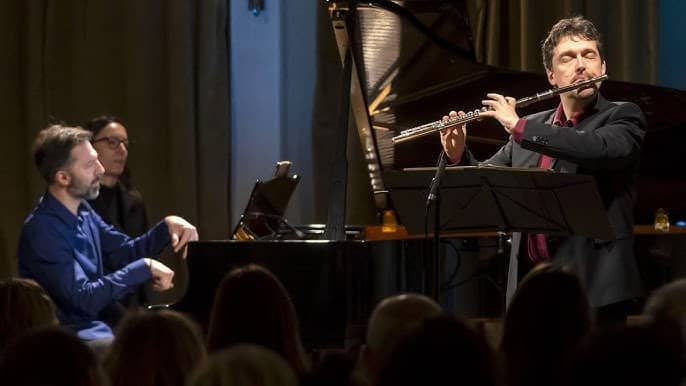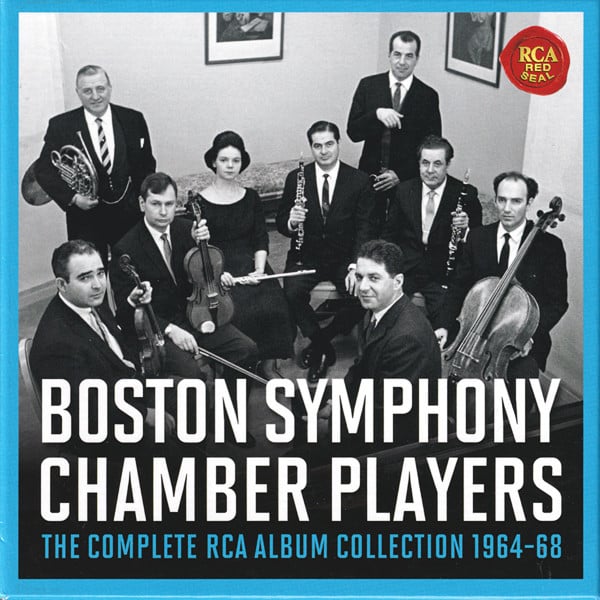Composer Kyle Gann: Interest in my music has settled around zero
mainFrom an interview with Michael Johnson:
In the last few years my music has completely fallen off the map. Except for
a small frisson that “Hyperchromatica” seems to have created among young
microtonalists, interest in my music has settled around zero. There are many
plausible reasons: I’m a white male in an identity-politics era, my approach to
microtonality is too baffling, everyone ignores composers who haven’t become
brand names by a certain age, I live in the boondocks, I’m not a “people
person.” For the first time since the 1980s I have just gone 14 months without
composing anything. At the moment I can’t stand the thought of putting energy
into something no one will perform. Perhaps this will change again.
This interview will appear in the forthcoming book “What Musicians Really
Think” along with 29 other interviews with composers and performers.







Does Mr. Gann’s remark, “I’m a white male in an identity-politics era,” suggest that all previous interest in his music was a result of white privilege?
this doesn’t follow logically. What it does suggest that -disinterest- in white males is the result of making sure that other voices are heard.
The problem is that ‘voices’ are not white, or male, or whatever – they are voices.
At least I wasn’t shamed by name.
As a composer myself, I understand his position and reflections on the matters of politics and “fashion” aesthetics. But we should keep true to our own voice and beliefs. Trying to focus on all of the important technical, aesthetic and other relevant aspects of music creative practice, trying to not get carried by those fashions. It is difficult but staying true to our own commitment of expression is the most relevant and fulfilling point in this kind of creative work.
Entirely true.
Has nothing to do with being a white male of a certain age. It’s just that there’s not much interest in complex musical wallpaper. People want tunes, music they can remember, music that gives them a positive, uplifting feeling. You know: toe tappers. Frankly, things like Hyperchromatica make me seasick; it reminds me of a badly out of tune piano I came across in a saloon in Wyoming years ago….but you should know that just today I had Summer Serenade on the playlist while reading the paper. Beautiful. But then you can’t de-tune an organ easily!
I have just had a listen to some of his pieces in the internet, apart from a piece for string quartet I could not find a single piece that I liked.
It’s not my music either, but like you I went through a few pieces on the internet to get a fix on what he was composing (when he was composing) and I must say I have heard worse. Included by major orchestras as part of their bite-your-tongue-and-play-it new music offerings.
Still, I wouldn’t play it at home.
“Except fora small frisson that “Hyperchromatica” seems to have created among young microtonalists, interest in my music has settled around zero.”
No wonder. You’ve lost me and 99% of the audience at “hyperchromatica” and “microtonalists.”
This is unfortunate. Kyle Gann is an important voice in the American experimentalist movement that stems back to composers like Henry Cowell and Harry Partch. And through his musicological work, he has contributed greatly to the new music community (even if I disagree with some of his assessments like those of George Crumb.) I hope he will take heart and get back to work.
Never heard (of) him, but then, how can you have heard a composer if he / she doesn’t compose anything?
Beethoven isn’t writing much these days either.
I always wondered why that would be, he was just getting up steam.
Evidently he is now decomposing.
Having (a) never heard of Mr Gann and (b) been astonished by his misplaced bitterness I had a trawl around the internet to find a few pieces. ‘Romance postmoderne’ for 2 microtonally prepared pianos was just puzzling. Why make it sound like a couple of clapped out old pub pianos? Of course he’s perfectly entitled to write however he chooses but equally, listeners have the same rights to switch off if aurally offended.
‘Olana’ was pleasant enough in an almost Einaudi-like way (and that’s a bit of a back-handed compliment) ditto ‘Summer Serenade’.
I’m sure that he’s an intelligent man but that doesn’t mean that the whole listening world will automatically want to hear his pieces.
Sorry Mr Gann but the world owes no one a living, let alone the right to automatic acceptance.
https://kylegann.com/complist.html
There is some true in what he says – being a white male does not help lately -, but that is not the reason why his music is not performed. Composers are not programmed for several reasons: their ouvre is not known by the programmers, there is a political ban on their music, or the music is not of enough quality or merit. It has nothing to do with the composer’s musical language; there is space for every voice when the music is good.
So…. unkown composer, political ban, or not good enough. You decide which one it is in the case of Gann.
It’s almost impossible to know when microtonal noise is ‘not god enough’. In another comment Ligeti’s Ramifications was mentioned – yes, that’s an interesting piece of sonic art but what else can be of the same idea after a few minutes?
“what else can be of the same idea after a few minutes?”
A lot, apparently. Sofia Gubaidulina has occasionally adopted the same technique of having a portion of the strings tuned a quarter-tone apart from the rest, including in pieces that are performed quite often.
Since Sofia wrote an orchestral piece including a solo for the conductor – i.e. waving his hands in silence – I gave-up my attempts to mobilize some interest in her work.
To each his own, and although there is plenty of modern and even atonal music I like, I tend to prefer music with harmonies and melodies that work on the senses in a more natural way. For instance “Frantumi” (14 minutes of 8 songs in Italian) composed by Fredric Kroll in 1969, but sounding as if written much earlier. Performed here by Elisabeth Kulman –
https://www.youtube.com/watch?v=Csm_BV8OJFw
Sympathetic but hopelessly naive and underdeveloped. Writing traditional, tonal music is more difficult than that.
There are many composers world-wide producing music that no-one wants to listen to. Who do they think they are writing for? Or not, in this case.
Usually they are writing to please hiring committees at universities so they can get hired and earn a paycheck. So in an odd twist of fate “selling out” used to mean writing for the masses. Now it means writing for the few.
Microtones are hard to digest. One of the smartest efforts was surely Ligeti who in Ramifications had two groups of strings tuned a 1/4 of tone apart and you can hear the shifts and shadings between them goining in and out of phase. That works brilliantly – but with an ‘anything goes’ approach like Mr Gann’s, it’s just too congested.
Ligeti’s piece of sonic art sounds like lunch time in a bee hive, being disturbed by a bunch of big bumble bees:
https://www.youtube.com/watch?v=9hOh73Ik6UQ
Except for biologists, not very interesting.
Gann wrote an interesting piece for string quartet which consists of spiralling canons:
https://www.youtube.com/watch?v=xKnsb_7iREc
His ‘Hyperchromatica’ series is interesting for people enjoying out-of-tune pianos:
https://www.youtube.com/watch?v=aREG8kn-3hM
https://www.youtube.com/watch?v=SdIrlRVXomE
His Wild West impression with electronics is quite surrealistic and unlistenable for a musically-interested audience:
https://www.youtube.com/watch?v=A4iarajloTU
In fact, all of this is very average music, subjected to intellectual processes. The point lies in the process, not in the music. The composer does not appear to have wanted to convey something in a musical sense, it is all rationalistic and quasi-objective. And this is part of a dominating trend in the last century, appearing in very different forms, and thus touches a fundamental problem of new music since 1900.
I once wanted to engage with him about this subject on his website, but was grumpily rejected for not agreeing with his theories.
Can’t get far if you are a white male AND grumpy…
The irony is that with this interview, and NL’s blog post about it, numerous readers click onto to video/audio streaming sites to have a listen to Gann’s output, in the last 24hrs he’s probably had his largest ever collective audience. Trouble is, no one likes his music. So who exactly is having the last laugh here?
His spiralling canon for string quartet however, is very good.
https://www.youtube.com/watch?v=xKnsb_7iREc
I’m afraid I find it uninteresting (and not well-played). As observed elsewhere, too much dependance on process, not enough inspiration in result.
But obviously, inspiration in terms of musical inspiration, was never the intention, it is a piece about processes and whatever inspiration was involved was in the idea of the process.
Incidentally, he’s a wonderful writer *about* music. His writing on contemporary music in the Village Voice in the 80s was a textbook for many.
Kyle was also a very astute and perceptive record reviewer for Fanfare. Of course he and I reviewed totally unlike stuff, so at least he and I never had one of the internecine feuds that complicated Joel Flegler’s day.
I’m sorry that he is unhappy in this way.
One reason why composers of, shall we say, “difficult” music have a hard time getting programmed by symphonies is that the money crunch has hit hard on rehearsal time, and in particular on extra rehearsal time. Today’s symphonic musicians are so good that, ironically, rehearsal time can be and has been cut to the bone without much if any harm to the end product — PROVIDED the end product is pretty standard stuff. But introduce an unfamiliar idiom, or in particular an unfamiliar manner of notation, and now that has budget implications, quite apart from the costs associated with music that isn’t P.D. Even an Honegger symphony on the program might mean something else gets a run-through at most.
It is not only a problem with ‘difficult’ music – if with difficult is meant: complex modernist music. New pieces in a more traditional idiom suffer also from insufficient rehearsel time because conductors are happy as soon as the notes are in the right place, which is quicker done. Expression, interpretation, the right balance, structural flow, all of that requires as much time as an unknown Beethoven symphony.
As on that note: imagine an unknown Beethoven piece were unearthed, and it was unknown it were a Beethoven thing, it would be treated as carelessly as any new tonal piece. It is only when orchestra staff and conductor are, beforehand, convinced of the quality of what they have planned, that enough time will be planned. And that is at rare occasions.
Also it should not be forgotten that with a modernist complex work, mistakes are hardly ever noticed, since the notion of ‘right’ or ‘wrong’ does not apply there. When gestures are more or less OK, more efforts don’t make much difference.
Less ranting, more writing good music. What an arrogant person he seems to be!
==Incidentally, he’s a wonderful writer *about* music.
I find that’s often the case with contemporary composers. I’d much sooner hear Thomas Ades speak (or read one of his articles) than listen to any of his music. Same goes for George Benjamin – I found his beautifully written articles after the deaths of Messiaen and Boulez far more affecting than any of the music he’s written